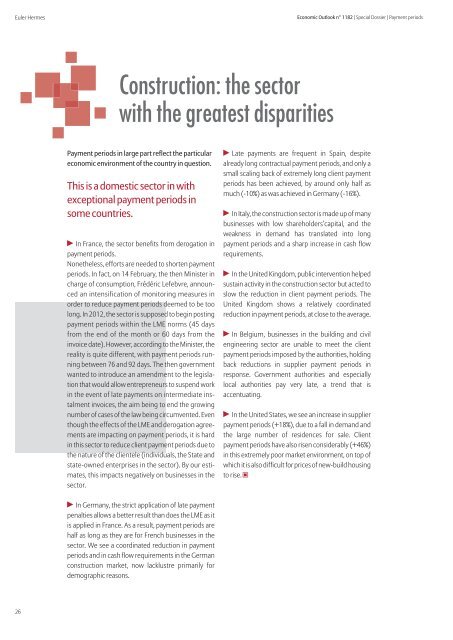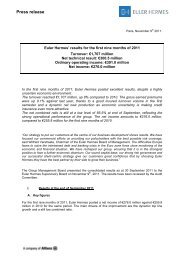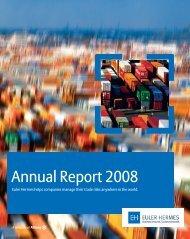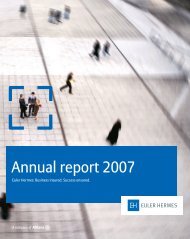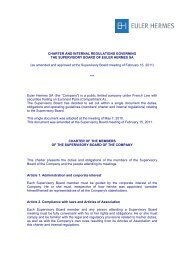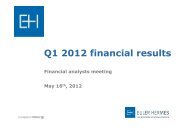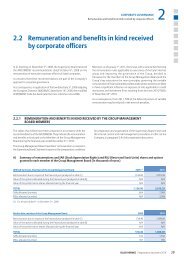Create successful ePaper yourself
Turn your PDF publications into a flip-book with our unique Google optimized e-Paper software.
<strong>Euler</strong> <strong>Hermes</strong><br />
26<br />
Construction: the sector<br />
with the greatest disparities<br />
<strong>Payment</strong> <strong>periods</strong> <strong>in</strong> large part reflect the particular<br />
economic environment of the country <strong>in</strong> question.<br />
This is a domestic sector <strong>in</strong> with<br />
exceptional payment <strong>periods</strong> <strong>in</strong><br />
some countries.<br />
> In France, the sector benefits from derogation <strong>in</strong><br />
payment <strong>periods</strong>.<br />
Nonetheless, efforts are needed to shorten payment<br />
<strong>periods</strong>. In fact, on 14 February, the then M<strong>in</strong>ister <strong>in</strong><br />
charge of consumption, Frédéric Lefebvre, announced<br />
an <strong>in</strong>tensification of monitor<strong>in</strong>g measures <strong>in</strong><br />
order to reduce payment <strong>periods</strong> deemed to be too<br />
long. In 2012, the sector is supposed to beg<strong>in</strong> post<strong>in</strong>g<br />
payment <strong>periods</strong> with<strong>in</strong> the LME norms (45 days<br />
from the end of the month or 60 days from the<br />
<strong>in</strong>voice date). However, accord<strong>in</strong>g to the M<strong>in</strong>ister, the<br />
reality is quite different, with payment <strong>periods</strong> runn<strong>in</strong>g<br />
between 76 and 92 days. The then government<br />
wanted to <strong>in</strong>troduce an amendment to the legislation<br />
that would allow entrepreneurs to suspend work<br />
<strong>in</strong> the event of late payments on <strong>in</strong>termediate <strong>in</strong>stalment<br />
<strong>in</strong>voices, the aim be<strong>in</strong>g to end the grow<strong>in</strong>g<br />
number of cases of the law be<strong>in</strong>g circumvented. Even<br />
though the effects of the LME and derogation agreements<br />
are impact<strong>in</strong>g on payment <strong>periods</strong>, it is hard<br />
<strong>in</strong> this sector to reduce client payment <strong>periods</strong> due to<br />
the nature of the clientele (<strong>in</strong>dividuals, the State and<br />
state-owned enterprises <strong>in</strong> the sector). By our estimates,<br />
this impacts negatively on bus<strong>in</strong>esses <strong>in</strong> the<br />
sector.<br />
> In Germany, the strict application of late payment<br />
penalties allows a better result than does the LME as it<br />
is applied <strong>in</strong> France. As a result, payment <strong>periods</strong> are<br />
half as long as they are for French bus<strong>in</strong>esses <strong>in</strong> the<br />
sector. We see a coord<strong>in</strong>ated reduction <strong>in</strong> payment<br />
<strong>periods</strong> and <strong>in</strong> cash flow requirements <strong>in</strong> the German<br />
construction market, now lacklustre primarily for<br />
demographic reasons.<br />
Economic Outlook n° 1182 | Special Dossier | <strong>Payment</strong> <strong>periods</strong><br />
> Late payments are frequent <strong>in</strong> Spa<strong>in</strong>, despite<br />
already long contractual payment <strong>periods</strong>, and only a<br />
small scal<strong>in</strong>g back of extremely long client payment<br />
<strong>periods</strong> has been achieved, by around only half as<br />
much (-10%) as was achieved <strong>in</strong> Germany (-16%).<br />
> In Italy, the construction sector is made up of many<br />
bus<strong>in</strong>esses with low shareholders’capital, and the<br />
weakness <strong>in</strong> demand has translated <strong>in</strong>to long<br />
payment <strong>periods</strong> and a sharp <strong>in</strong>crease <strong>in</strong> cash flow<br />
requirements.<br />
> In the United K<strong>in</strong>gdom, public <strong>in</strong>tervention helped<br />
susta<strong>in</strong> activity <strong>in</strong> the construction sector but acted to<br />
slow the reduction <strong>in</strong> client payment <strong>periods</strong>. The<br />
United K<strong>in</strong>gdom shows a relatively coord<strong>in</strong>ated<br />
reduction <strong>in</strong> payment <strong>periods</strong>, at close to the average.<br />
> In Belgium, bus<strong>in</strong>esses <strong>in</strong> the build<strong>in</strong>g and civil<br />
eng<strong>in</strong>eer<strong>in</strong>g sector are unable to meet the client<br />
payment <strong>periods</strong> imposed by the authorities, hold<strong>in</strong>g<br />
back reductions <strong>in</strong> supplier payment <strong>periods</strong> <strong>in</strong><br />
response. Government authorities and especially<br />
local authorities pay very late, a trend that is<br />
accentuat<strong>in</strong>g.<br />
> In the United States, we see an <strong>in</strong>crease <strong>in</strong> supplier<br />
payment <strong>periods</strong> (+18%), due to a fall <strong>in</strong> demand and<br />
the large number of residences for sale. Client<br />
payment <strong>periods</strong> have also risen considerably (+46%)<br />
<strong>in</strong> this extremely poor market environment, on top of<br />
which it is also difficult for prices of new-build hous<strong>in</strong>g<br />
to rise. ▣


